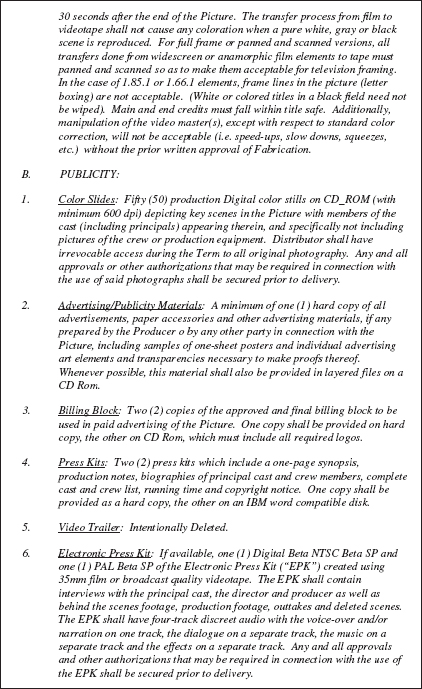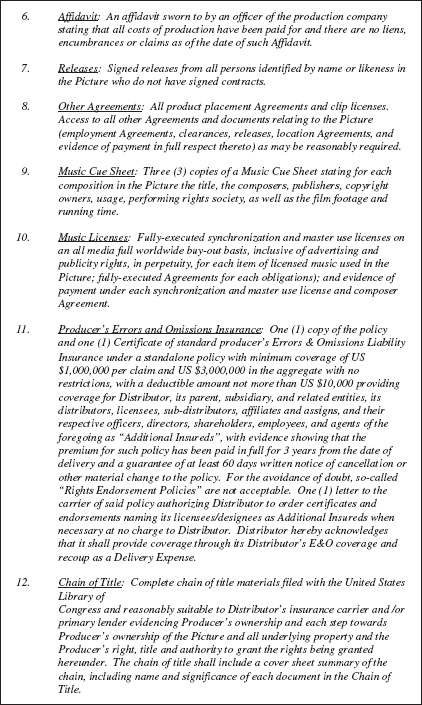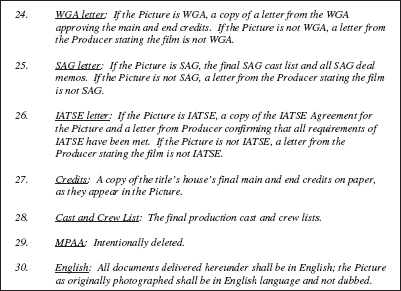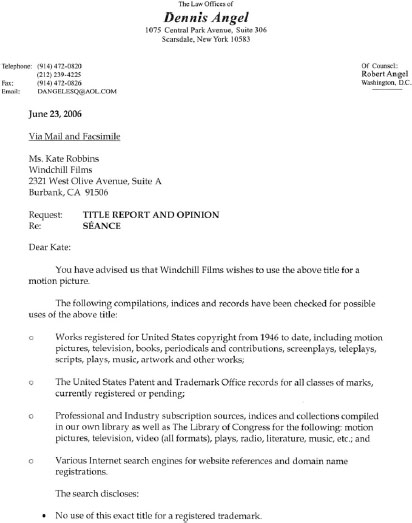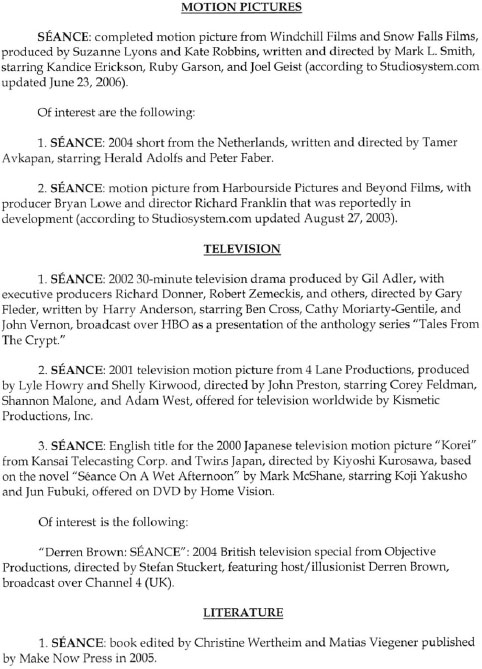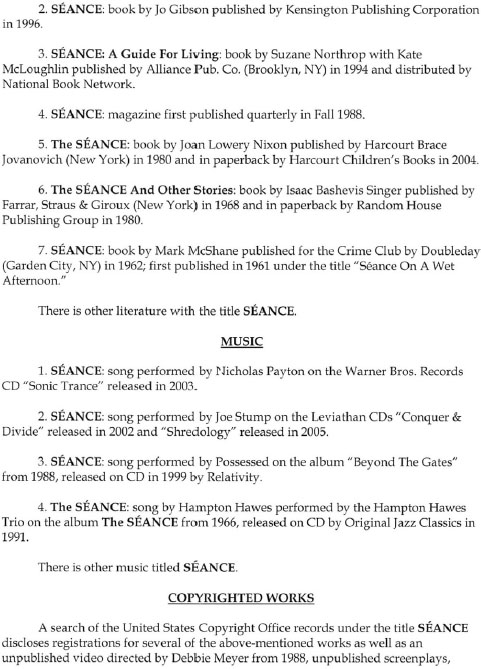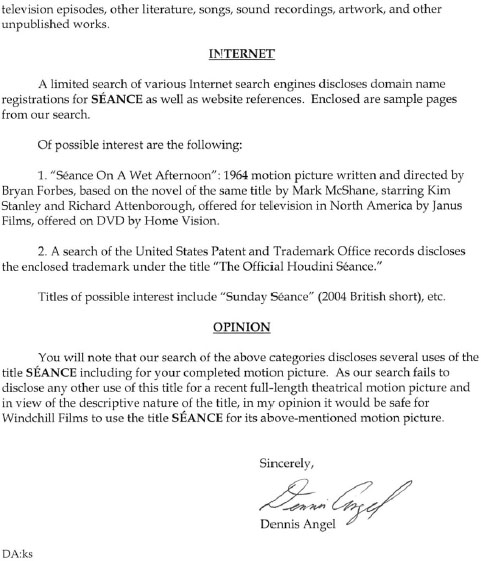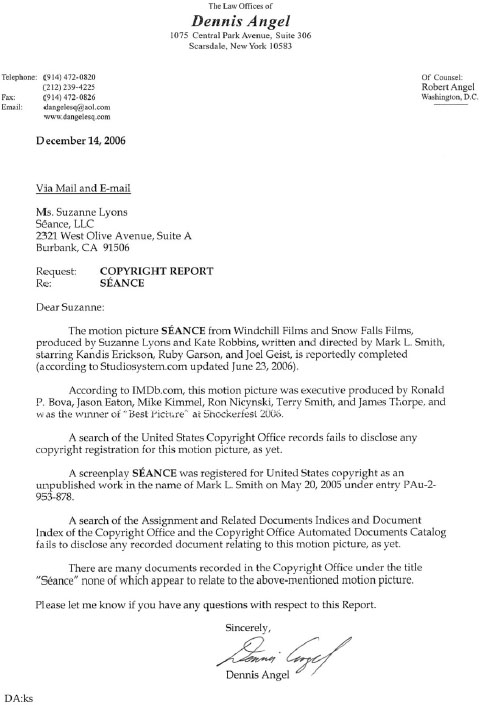Delivery and Sales Agents
Now that postproduction is complete and you’ve got your DVD with the burn (“For Viewing Purposes Only”), it’s time to go back and look at the festivals where you’ve sent your initial version of the film. Remember, that version had no color correction, sound design, composer’s score, or final main or end credits. So it’s time to get the fresh completed DVD off to them. Because pirating has become so frequent, you may want to consider placing your burn a little higher on the screen. Our sales agents have recommended that we do this on our last few films. It’s a bit more distracting, but it does discourage pirating.
It’s also time to replace the old DVD that went off to your selected sales agents. Get them the new copy and if any newsworthy items have happened during these two to three months, send that news along as well – for example, if you’ve been accepted into any of the film festivals, if you have a new press release that went out, or one of your cast or anyone else involved in the film has won an award or been cast in a studio movie or TV show. Be sure to include anything new, fun and exciting.
PUT THE HORSE BEFORE THE CART
In the early chapters of this book, I mentioned the importance of being aware of all the elements related to delivering your film long before you ever shoot your first frame. Throughout the entire book, I’ve been trying to take you through the producing process one tiny step at a time. My goal has been to make film producing look easy because it is easy when you break it into small doable pieces. It’s no different from anything else in life.
However, although I’ve been encouraging you to start at the beginning and go step by step, the one area where you must focus on the end before beginning is delivery. I know delivery is one of the final pieces, but it is the one piece that you have to get acquainted with up front. In fact, I would have to say that of the hundreds and hundreds of producers I have talked with over the years, the biggest mistake we’ve made – and we’ve all made it – is that we’ve waited until we’re ready to deliver the film before learning about delivery requirements.
There are items in that list that you will need to know about as early in the film making process as the script stage. Kate and I shot Undertaking Betty in the fall of 2001, and a year later we got a call from our sales agent saying that she needed our script clearance report to send to the company that was providing our E&O insurance. By the way, no E&O insurance means no domestic delivery of our film! We didn’t even know what a script clearance report was, so needless to say, we didn’t have one.
A script clearance report is a report done by a company that gives you a list of the areas you need to address long before you shoot your film. Here’s an example of something we overlooked that could have kept the film from ever being released. In our romantic comedy Undertaking Betty, the mother-in-law chokes on some chocolates and the box of chocolates is sitting on her lap with the name of the company clearly displayed. This would have been fine if it had been a fictitious company or even if an original box had been greeked (obscured) in some way to make the company name look fictitious. However, neither had been done, so it was the real chocolate company’s name on the box. We had no letter from the chocolate company granting us permission because we didn’t know we needed it.
I have producer friends whose movies have never and will never see the light of day because of these types of problems. One of my students in my low-budget workshop told us how his first film (which cost $300,000 to make!) will never be seen because he had Coke cans through the film, cars with visible license plates, full names that were never cleared for some of his evil characters, and a ton of other products completely visible – yet no permission letter. He just didn’t know he needed the rights to use them. As I mentioned in my introduction, I have a friend whose movie will never be released because he failed to get the option agreement signed and now has no chain of title, one of the most critical items on the delivery list. Remember, if you can’t deliver the items on the delivery list, you don’t get to deliver your movie. No delivery, no money!
Luckily, Kate and I got a break. We called the chocolate company and explained what happened, and they said that they would gladly give us a letter granting us permission. They were incredibly gracious – and we were very, very lucky. I know what some of you are thinking: “If I made that mistake, I would just go in and do a little CGI surgery to clean it up.” Sorry, the film is done. Going back in will cost money – a lot of money. Money you probably don’t have. A script clearance company will alert you to every possible potential issue long before you ever shoot your film. Handle those items now, not when your film is complete.
MISTAKES CAN BE EXPENSIVE
I hope I have scared you sufficiently to get you to look over a film delivery list well in advance of production. After learning a few of these lessons the hard way, my advice to you is to start working on delivery as early as possible. If you have time during preproduction, principal photography, or postproduction, look at your list and see what you can complete. Kate and I did that during the production of Portal, and by the time we had to deliver, 80 percent of it was already done.
Call sales agents and get their lists. Figure 12.1 shows the list we got from one of our sales agents. It is the longest list I’ve ever received, but I encourage you to use this as your template. Keep in mind that some of the items may be outdated, as technology changes rapidly.
I realize that this list looks daunting, but if it is something you have access to well in advance – which you now do – then you can begin getting prepared in advance.
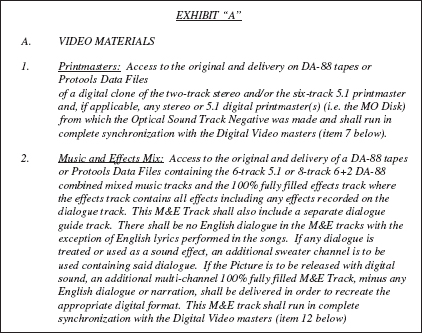
FIGURE 12.1
THE COST OF DELIVERY
You can see from some of the items on the example list how important it is to raise the money for delivery while you are raising funding for the film. Why people don’t do that is a complete mystery to me. We estimated at our budget that we would need an additional $20,000 for delivery costs. Another way to come up with the amount would be to go through the list and make some calls to get estimates. See what you might want to take on yourself that could cut down on the costs. For example, when we checked on the price for the dialog spotting list, we realized that it was pretty expensive at nearly $2,000, so Kate said she would learn how to do it and we would save that money. It took her two weeks to complete the dialog spotting and it was a pretty grueling experience, as she had to go through the time-coded DVD line by line and create the dialog spotting. But saving $2,000 was worth it.
ITEMS TO WATCH FOR
A pan-and-scan is one thing to watch for. It is a method of printing films for presentation on television that modifies the rectangular theater image by trimming the sides and focusing on significant action within the newly truncated image. When it comes to the pan-and-scan of your film, I suggest that you or your director be present during this process. Otherwise, if it is left to the distributor, you may very well end up with a film that you’re not happy with. When we saw the pan-and-scan that the distributor had done on one of our films, we realized that they had not taken the time to include all the great stuff that was happening on the periphery of the screen, so we had it redone. Because we had the money in our delivery items to pay for it, it was worth it to have it done correctly. When you or your director is in the suite sitting with the pan-and-scan technician, you can make sure that he or she is including all the action that is happening on every corner of the screen.
A couple of other important items are the title report and the copyright report. These are items that are part of the delivery list. The title report is needed to show that there are no other films using the identical name that you are using as your film’s title. Kate and I used Dennis Angel’s company on all of our films. Dennis Angel’s company provides legal chain of title opinions. They review all the full documents and give an opinion as to who owns the various rights in the property. Figure 12.2 shows the title report we got back on Séance.
FIGURE 12.2
In addition, you will be required to obtain a copyright report. I realize we talked about copyrights way back in Chapter 3 and again in Chapter 11, but this is a little different. This report proves that you have done the copyright paperwork for you film. Figure 12.3 shows the one we got back from Dennis Angel on Séance.
FIGURE 12.3
I am showing you this report because, as you can see, even though Kate and I had sent the copyright registration form and payment to Washington months prior, the copyright office had not yet processed our forms. So attached to this report, we included a copy of the forms we had submitted, along with a copy of the check showing that we had paid the registration fee.
SALES AGENT OR NOT?
If you choose to self-distribute, you won’t need to worry about the next piece, but I still think it’s wise to know the details about getting a sales agent. You may change your mind at some point and decide that you do want to go for the sales agent, so it’s always good to have the knowledge.
THE TABLES ARE TURNING
Things have changed quite dramatically in the past few years. The fact that many producers are looking to self-distribute, the alarming rate of increase in pirating, and the downturn in the economy (which affects the amounts territories are willing to pay) have caused havoc for sales agents and distributors. And of course the digital camera has made it possible for thousands more producers to make their films under amazingly low budgets, causing a glut of product. For the first time in history, the tables are turning, and many sales agents are being forced to close up shop.
The Internet, in particular, has created a new way of doing business, and producers are taking full advantage of this. In the next chapter, I interview a few people who are enjoying the independence and potential financial benefits of self-distribution.
PROBLEMS WITH THE OLD MODEL
Only a few years ago, when we were doing our deals on Candy Stripers, Séance, and Portal, we were very much at the mercy of whatever deal our sales agent would bring to us from the distributor. Unless there was big competition for the film, there was no negotiating with the distributors. Take it or leave it! And trying to get any back end was difficult. Getting a back end return is important not necessarily because of the money (you’ll probably never see any of it) but because it would be great to have the quarterly records so that if your film is doing well, you can use that information to raise money for your next film. Even if you have a great sales agent or producer’s rep, they can push only so hard to get you the best deal with the distributors.
BUY-OUTS
Another difficult element for the producer is the fact that the distributor in each territory does what is called a “buy-out.” In other words, they pay a flat fee for the film for a specified number of years. Because of this, it is extremely important that you tell your sales agent that you want the term of the deal to be as short as possible. It is imperative that you ask for this option specifically, because your sales agent really doesn’t care, and if the distributor in that territory says they want 15 or 20 years, your sales agent will agree. So be sure to have a conversation with them about this and request that they keep the number of years to five or seven for foreign territories. You want to be able to have the opportunity to resell the film in each territory, and more important, you want to get your films back for your own library down the road. The domestic sale is the most difficult in terms of the number of years, so try to get it down to 15 years if possible.
CHANGES ARE HAPPENING
The good news is that distributors, including domestic distributors, are far more open to negotiating deals today. They are even doing split rights deals. Producers are able to maintain the rights to sell DVDs (and VODs) on their own websites, keep the right to create and sell merchandise related to their film, and a ton of other options that were not even open for discussion just a few years ago.
YOUR DEAL WITH A SALES AGENT: DO YOUR RESEARCH!
When it comes to doing your deal with the sales agent who will be taking your film to the markets, be sure to do your due diligence. When Kate and I first started Snowfall Films, we made the decision to go to AFM, and we met nearly every sales agent at that market. We had done our homework in advance and researched who was focusing on the types of films we were looking to produce. We read the bumper issues (weekly issues) of the Hollywood Reporter that highlighted the previous year’s film markets. The trades list not only each sales agent but also what films they are selling so you can get a fairly good sense of who is doing what.
In addition, we started asking our mentors and other producers whom they would recommend. So even if you can’t get to a market, when you are looking to choose a particular sales agent, contact other producers who have worked with them to find out what their experience was.
Hopefully, you will have healthy competition with more than one company wanting your film. That way the power is in your hands when it comes to doing the deal. However, even if you have only one sales agent interested in selling your project, there are certain items to be aware of when it comes to making your deal with them. Here are eleven points to consider while doing your deal.
Expenses
For years, sales agents have had a fixed amount they put in their deals for their expenses. It was $50,000 to $75,000, and on the low-budget films, that’s crazy. With the amount of money we are now getting per territory, $50,000 to $75,000 for expenses is just way too high. I know they are going to be doing a trailer, getting posters and one-sheets, and of course attending multiple markets. All of that costs money, but you are not their only film. I have done a deal at $15,000 and one at $25,000 for their expenses. Even if it means you have to do your own trailer, it’s worth bringing the cost of their expenses down. The way it works is that their expenses come off the first money in, so please keep that in mind when you are telling your investors about the first sale. Please note: If you do end up having to do your own trailer, be sure to ask for their advice and suggestions before you produce it. The trailer can make or break a deal, and sales agents have been selling films to international buyers for years; they know what makes a great and marketable trailer.
Commission
When you are dealing with sales agents’ commissions, I would agree to do no more than a 20 percent commission. In fact, what Kate and I have done on a few of our films is offer a two-tier deal. Until we reached the amount where our investors would be paid back, our sales agent would get a 15 percent commission on foreign territory sales, and the minute we had reached that amount, they would begin to get a 20 percent commission. It was fair and it created an incentive at the same time. If your sales agent is planning to handle your domestic sale, the norm for a domestic sale is a 10 percent commission.
Get a Copy of Each Territory Deal
Getting a copy of each territory deal sounds like something you would assume – of course you would be privy to the contracts done with the territories on your film. We assumed it, and in two different cases when I called to say that I had received the quarterly report and the check but had not received the territory deal memos, I was told that we had no right to them. Years from now, how am I supposed to renew the sales? That sales agent will be long gone, and I will need to renew those territory sales. It is crazy that I don’t have a copy of the original contracts. In fact, we are dealing with that very issue right now on one of our first films. We are in the process of renewing nine different territories, and I can’t imagine what that would be like if we weren’t able to refer to their original deal. So please make a note of this point, and although it sounds like common sense, make certain to put it in your contract with your sales agent.
Keep the Number of Years Low and Get Back-End Deals
Talk to your sales agent before every market and remind them that when they are doing each territory sale, you want them to keep the term (number of years) to a minimum. You want to be able to resell to those territories in a reasonable number of years. For foreign territories, try to keep the terms of a deal to no more than five to seven years. Of course, this is more difficult to demand when it comes to the domestic sales, because the norm is often 15 years or longer. Try to get it down to 10 or 12, but certainly no more than 15. In addition, have your sales agent push for back-end deals, especially if they are handling your domestic sale. As I mentioned earlier, it’s not so much about the money as it is about having the quarterly reports that will let you know how your film is selling. If it’s doing well, it’s great ammunition for your next business plan.
Money Goes Into Your Bank Account
Having the money go into your bank account may be an issue for some sales agents, but I would fight for this one. Kate and I have done this in the past, and it makes everything so easy. You don’t have to wait until the quarterly or semiannual report from your sales agent to see your money on territory sales that were done months and months before. And in many cases (we’ve had a few), you don’t have to be hounding the sales agents to send you the check. It should go directly into your account, and then you pay the money owed to the sales agent for their commission and expenses. After all, it’s your money. That way there is no waiting and you can get it directly back to your investors.
If they have a concern about your paying them their commission promptly, all you have to do is state in your deal with them that you will mail (or messenger) their check to them within 24 hours of the money going into your film’s bank account. It is simple, fast, and a win/win for everyone. Otherwise, when your money goes into their account first, you run the risk of getting it late – or worse, not at all. We have had two different situations over the years in which our sales agent literally took the money and used it, in one case to pay off debts on bigger projects, and in another case just took it and left the industry – and the country. It’s your money, and it should go directly into your account.
Have Them Check With You if the Amount Is Below the Estimate
This point is fairly standard, but just be certain that it is in your deal. You might want to remind your sales agent prior to each market just so they are conscious and will remember to call you if they get an offer that comes in below their estimated amounts.
Which Territory Sold?
Knowing which territory sold may sound like common sense as well, but we had one situation where we would get a quarterly report with a check included, but there would be no way of knowing which territory it was from. This was the company that refused to give us the territory contracts. I wanted to know so that I could not only keep track but also inform the investors. So be aware of this issue and include it in your deal memo with your sales agent.
Do They Have an E&O Umbrella?
Often, your sales agent who is doing your foreign territory sales will handle your domestic sale as well. You will need to purchase E&O insurance if you get a domestic sale, and if your sales agent has an existing E&O umbrella policy, it may be cheaper for you to purchase it under their policy. We have always had to buy our own E&O insurance, but I would ask your sales agent before you purchase your own.
Get a Box Of Dvds
Okay, this sounds downright silly. You would think that if the domestic sale includes a DVD release, you would automatically get a box to give to your investors, your lead actors, and your director. I have never thought to put it in the deal with our sales agent. It was always something that we just assumed. Well as I have said before: never assume. Put it in the sales agent’s deal so that they can put it in the deal they do with the domestic distributor. If you use a producer’s rep or someone else to do your domestic sale, mention it to them. I have had to fight to get even a handful of DVDs in each case – and on some films, we’ve received none.
If They are Doing Your Domestic Sale, be at That Meeting
If your sales agent is doing your domestic deal and you are in the same city, I strongly suggest you be at those meetings. The domestic sale is extremely important, and these days, the domestic distributors are far more open to split rights deals. This is your baby; given that the domestic deal demands a longer term, it’s important that you know exactly what you’re entering into. If you aren’t at these meetings, make absolutely certain that you speak with your sales agent or producers rep before they do the deal and go over exactly what you want with them. In addition, make certain that you get copies of the contract and go over it line by line until you are happy with every detail.
Exit Clause
When you are doing your deal with your sales agent, be sure to put an exit clause in their contract. For example, if they have not sold a certain number of territories that total a specific amount of money by a specified date, then you get the project back from them free and clear. That way you are able to go to another sales agent and begin again. I think in one of our deals, we specified that if they didn’t bring in a minimum of $375,000 within 24 months from delivery (which would give them time to attend the three major markets twice), then we got our film back and were free to shop for a new sales agent, should we choose to. The major markets are the AFM, Berlin, and Cannes. By the time your sales agent has attended each one at least two times, they have usually exhausted the possibility of a sale, and they have most likely lost interest in your film.


